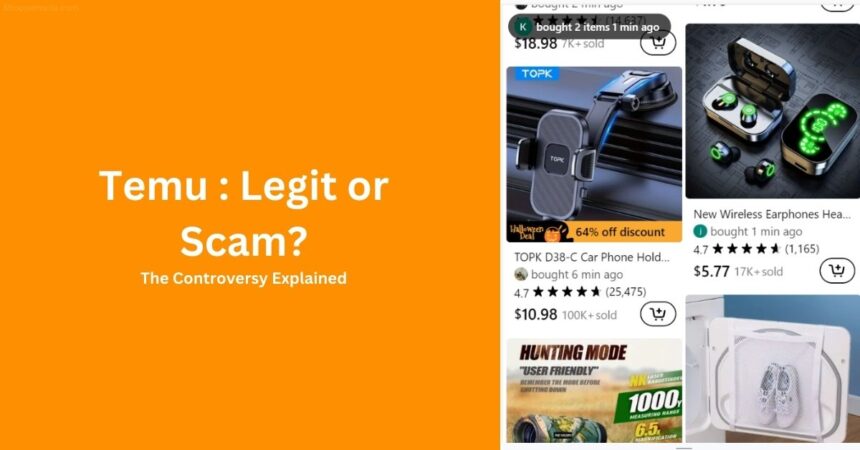Temu has become one of the most talked-about new online retailers in 2022, skyrocketing to immense popularity seemingly overnight. However, serious questions have arisen surrounding Temu’s legitimacy, business practices, and safety for consumers. This article will dive deep into the controversy around Temu to help you determine if it is a scam or a source you can trust.
What Exactly is Temu and Why Has it Become So Popular?
Temu is an online marketplace launched in September 2022 that offers rock-bottom prices on a staggering array of products shipped directly from Chinese suppliers and warehouses. From home appliances and clothes to toys and electronics, Temu claims to undercut competitors by up to 90%.
The company is able to offer such low prices by cutting out middlemen and connecting customers directly with manufacturers. Temu handles logistics and shipping but does not actually own inventory.
Temu is owned by PDD Holdings, a multinational commerce group that also operates Pinduoduo, a major e-commerce site in China. While officially headquartered in Boston, Temu’s origins and operations remain closely tied to China.
This hyper-affordable pricing coupled with Temu’s aggressive social media marketing has fueled its meteoric rise. The company incentivizes users to promote Temu across their social networks, scoring rewards when friends sign up.
But how does Temu offer such rock-bottom prices? And is the company truly as great as its viral hype suggests? Let’s take a closer look under the hood.
Why is Temu Offer So Cheap Products?
Temu’s prices are extraordinarily cheap, sometimes up to 90% less than retail. A winter coat for $10, Apple AirPods for $12, a massage gun for $50 — deals like these explain Temu’s viral success.
The company keeps costs down by working directly with suppliers, ordering in huge bulk quantities, and utilizing an overseas supply chain. Critics, however, argue Temu may be exploiting legal loopholes to import goods while avoiding taxes, tariffs, and duties.
Temu keeps costs low in several key ways:
Direct-to-Supplier Model: By purchasing wholesale direct from manufacturers, Temu skips middlemen markups. The company handles logistics but doesn’t own inventory.
China-Centric Supply Chain: Products ship direct from Chinese factories and warehouses. The overseas network avoids U.S. labor costs and regulations.
Shipping in Bulk: Large, bulk shipments mean Temu secures volume discounts from suppliers. Savings get passed to consumers.
Legal Loopholes?: Critics allege Temu exploits trade loopholes to import goods while dodging taxes, duties, and tariffs. This undercuts U.S. businesses.
Lack of Accountability?: Temu may benefit from lax regulatory oversight in China concerning labor practices, production ethics, IP protections, and more.
So Temu’s cheap prices likely stem from legitimate efficiencies. But, Questions also exist around how ethical and humane Temu’s supply chain is. Recent allegations claim Temu fails to properly audit suppliers, increasing the risk its cheap products are made using forced labor.
Temu Customer Reviews & Complaints
Temu’s reputation among customers is decidedly mixed. On one hand, you’ll find glowing reviews from satisfied bargain hunters who got their items quickly with no issues. On the other, angry complaints abound from those claiming Temu is a total scam.
- Positive Experiences – Some reviews praise Temu’s insanely cheap prices and say items arrived intact as described within 10-15 days. A few seem suspiciously over-the-top in their praise, however.
- Missing/Incorrect Orders – Many angry complaints involve orders that never arrived or completely wrong items being shipped. Refunds and returns are a major issue.
- Quality Concerns – While a few say product quality exceeds expectations given the low costs, others report shoddy, damaged, or fake-looking merchandise.
- Customer Service Nightmares – Myriad complaints describe Temu’s customer service as utterly useless in resolving issues. Wait times can be extreme.
- Data Theft Fears – A few customers speculate Temu may steal personal and payment data. Some report accounts being hacked after using Temu.
- Ethical Issues – Temu faces allegations of intellectual property theft and links to forced labor in China. Its practices have drawn government scrutiny.
So while bargain hunters can score deals, many consumers report getting scammed by Temu. The number and severity of negative reviews should give potential shoppers pause.
Who Owns Temu and Where is Temu Located?
Temu is owned by Chinese company PDD Holdings, which operates the Pinduoduo marketplace in China. Pinduoduo has faced controversies around poor working conditions, extreme overtime, and malware found in its app.
While officially headquartered in Boston since restructuring in 2022, Temu’s operations and supply chain remain closely tied to China. Most products are shipped direct from Chinese suppliers.
Some speculate Temu relocated partly to distance itself from its Chinese origins amid rising political tensions between China and the West. Doubts linger over how “American” the company really is.
Is Temu Ethical? Concerns Around Forced Labor and More
Serious ethical questions plague Temu regarding its supply chain, treatment of sellers, and more. Key issues include:
- Forced Labor – Temu is accused of failing to ensure its cheap products aren’t made with forced labor in China’s Xinjiang region, where human rights abuses against Uyghurs are rampant.
- Intellectual Property Theft – Sellers report Temu stole product images and listings from Amazon storefronts without consent. A lawsuit alleges trademark infringement.
- Data Risks – Governments have warned Temu poses an “extremely high risk” for abusing user data and presenting cybersecurity dangers.
- Worker Exploitation – Temu’s parent company Pinduoduo has been blasted for imposing extreme overtime expectations on employees in China.
- Trade Violations – Critics contend Temu exploits legal loopholes to dodge taxes, tariffs, and import duties. This undercuts American businesses.
While Temu claims to be ethical, it has much to prove before consumers should feel comfortable trusting it.
How Safe is Temu? Cyber, Quality, and Scam Dangers
Given the abundance of scathing reviews and shady practices, is Temu safe for shoppers? There are several risks to consider:
- No refunds – Many claim Temu refuses refunds for wrong, damaged, or undelivered orders. Customers are left high and dry.
- Fake/faulty goods – Numerous complaints involve low-quality products that don’t match listings or fall apart quickly. Knockoffs are a concern too.
- Data harvesting – Temu requests extensive personal data during signup. The app may expose users to intrusive surveillance or cyber threats.
- Exposure hacking – A few customers speculate Temu theft of payment info has led to credit card fraud or hacks of their other online accounts.
- Supporting unethical practices – Forced labor, intellectual property theft, and trade violations are reasons some consumers boycott Temu.
While Temu claims to offer purchase protection and money-back guarantees, countless reviewers say otherwise. Until Temu improves accountability and transparency, consumers shop at their own risk.
Is Temu a Legitimate E-Commerce Company or a Scam?
Temu exploded in popularity as an online marketplace promising unbeatable deals on products shipped direct from Chinese suppliers. However, serious doubts exist about whether Temu is a legitimate business or an outright scam.
Key Areas Where Temu Raises Red Flags
Several aspects of Temu’s operations raise alarming questions regarding its legitimacy and safety for consumers. Specifically, issues exist around:
- Temu’s marketing tactics
- The quality of products sold on Temu
- Delivery and return policies
- Treatment of sellers
- Data privacy and security
- Unethical practices in Temu’s supply chain
- Transparency around Temu’s origins
- Problems with customer service and support
Looking closely at each of these factors will help reveal if Temu is trustworthy or best avoided.
In Conclusion: Proceed with High Caution
In an incredibly short period, Temu has become one of the most talked-about online retailers. But further inspection reveals this viral success may stem largely from predatory practices and misleading marketing. Behind the buzz, Temu exhibits numerous red flags.
Potential customers should think twice before handing their data and money over to Temu. While its bargain-basement prices may be enticing, saving a few dollars is rarely worth the risk of being ripped off or scammed. At least until Temu proves itself more legitimate and secure, consumers are wise to stay away.
The story of Temu offers a cautionary tale of how breakneck growth and social media hype do not equate to trustworthiness. For any hot new ecommerce company, it pays to scrutinize it more closely before jumping aboard the viral bandwagon.
Frequently Asked Questions (FAQs)
1. Is Temu legit or a scam?
Temu has many red flags like fake reviews, quality issues, and poor customer service that indicate it may be a scam for some or many customers. However, some shoppers do seem to receive items successfully so Temu has legitimate aspects too. Overall, consumers should be very cautious using Temu.
2. What kind of products does Temu sell?
Temu sells a huge variety of products at ultra-low prices, including electronics, home goods, clothing, toys, and more. Most items ship direct from Chinese warehouses.
3. How can Temu offer such low prices?
Temu keeps prices low by purchasing wholesale directly from manufacturers, shipping in bulk from China to save costs, and potentially exploiting tax loopholes. Lower regulatory oversight in China may also enable cost-cutting.
4. Is it safe to buy from Temu?
Many customers report issues like credit card fraud, non-delivery of items, and poor-quality merchandise from Temu. There are risks due to minimal customer protections. However, some do shop successfully.









































